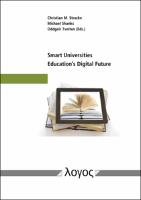Smart Universities
Contributor(s)
Stracke, Christian M. (editor)
Shanks, Michael (editor)
Tveiten, Oddgeir (editor)
Collection
Knowledge Unlatched (KU)Language
EnglishAbstract
Institutions of learning at all levels are challenged by a fast and accelerating pace of change in the development of communications technology. Conferences around the world address the issue. Research journals in a wide range of scholarly fields are placing the challenge of understanding "Education's Digital Future" on their agenda. The World Learning Summit and LINQ Conference 2017 proceedings take this as a point of origin. Noting how the future also has a past: Emergent uses of communications technologies in learning are of course neither new nor unfamiliar. What may be less familiar is the notion of "disruption", found in many of the conferences and journal entries currently.
Is the disruption of education and learning as transformative as in the case of the film industry, the music industry, journalism, and health? If so, clearly the challenge of understanding future learning and education goes to the core of institutions and organizations as much as pedagogy and practice in the classroom.
One approach to the pursuit of a critical debate is the concept of Smart Universities – educational institutions that adopt to the realities of digital online media in an encompassing manner: How can we as smarter universities and societies build sustainable learning eco systems for coming generations, where technologies serve learning and not the other way around? Perhaps that is the key question of our time, reflecting concerns and challenges in a variety of scholarly fields and disciplines? These proceedings present the results from an engaging event that took place from 7th to 9th of June 2017 in Kristiansand, Norway.


 Download
Download